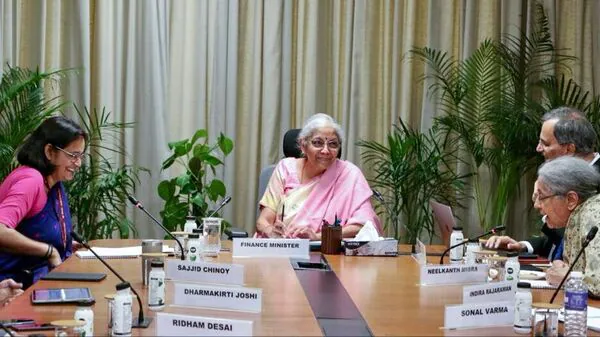
Sitharaman Begins Pre-Budget Consultations With Leading Economists
“Union Minister for Finance & Corporate Affairs Smt. @nsitharaman chairs the first Pre-Budget Consultation with leading economists in connection with the upcoming Union Budget 2026–27, in New Delhi today,” the Finance Ministry said in a post on X.
Also Read | Despite slow disbursals, Centre eyes bigger push for state capex in FY27The meeting, held in the presence of senior officials including Department of Economic Affairs secretary Anuradha Thakur and Chief Economic Adviser V. Anantha Nageswaran, brought together macroeconomic and agricultural experts from across academia and industry.
Those in attendance included Neelkanth Mishra, part-time member, EAC-PM (economic advisory council to the prime minister) and chief economist, Axis Bank; Sajid Chinoy, part-time member, EAC-PM and chief India economist, J.P. Morgan; Ridham Desai, managing director, Morgan Stanley; Dharmakirti Joshi, chief economist, CRISIL; and Sonal Varma, chief economist, Nomura.
Start of a seriesThe meeting marks the start of a series of pre-budget consultations the finance minister will hold with stakeholders to shape the government's fiscal strategy for FY27. The budget is usually presented on 1 February every year.
The finance minister's pre-budget schedule typically covers a broad range of stakeholders, farmer associations and agricultural economists, trade unions, the education and health sectors, employment and skilling bodies, MSMEs, trade and services groups, industry representatives, the financial sector and capital markets, infrastructure, energy, and urban sector players.
Also Read | Centre shifts focus from size of public capex to quality and impact of spendingThe Union Budget for 2025–26, presented in February, outlined a roadmap for inclusive and resilient growth amid a world unsettled by rising trade tariffs, supply chain realignments, and geopolitical tensions.
It sought to balance welfare and reform, prioritising agriculture, MSMEs, and rural prosperity, while invigorating private enterprise through higher capital expenditure, innovation incentives, and selective tax relief aimed at lifting consumption.
Demand expectedIn its latest Monthly Economic Review released late last month, the ministry of finance said recent cuts in Goods and Services Tax (GST) rates are expected to strengthen domestic demand by easing the tax burden on consumers and businesses, thereby spurring consumption, investment, and job creation across sectors.
The recent GST overhaul, which took effect on 22 September, cut the number of slabs from four to two, a 5% rate on essential goods and an 18% standard rate for most others, while retaining a 40% rate for luxury and 'sin' items such as cigarettes.
The ministry noted that robust performances in industry and services, coupled with a stable labour market are likely to sustain this momentum in the coming months. However, it cautioned that persistent global uncertainties could dampen exports and external demand, posing downside risks to overall growth.
Also Read | MoSPI proposes changes to India's housing inflation measurementOther participants included Indira Rajaraman; C. Veeramani, director, Centre for Development Studies; Nikhil Gupta, economist, CLSA; Lekha Chakraborty, Professor, National Institute of Public Finance and Policy; Ashwani Mahajan, national co-convenor, Swadeshi Jagran Manch; Laveesh Bhandari, president and senior fellow, Centre for Social and Economic Progress; Tanvee Gupta Jain, chief India economist, UBS; Namrata Mittal, economist, SBI Mutual Fund; Rohan Chinchwadkar, IIT Bombay; Pranjul Bhandari, chief India economist, HSBC; Abhiroop Mukhopadhyay, ISI Delhi; Pradeep Apte, Gokhale Institute and ICSSR council member; Atul Joshi, economist, Oyster Capital Management and Advisory LLP; and Vidhu Shekhar, financial economist, SP Jain Institute of Management & Research (SPJIMR) in Mumbai.
Legal Disclaimer:
MENAFN provides the
information “as is” without warranty of any kind. We do not accept
any responsibility or liability for the accuracy, content, images,
videos, licenses, completeness, legality, or reliability of the information
contained in this article. If you have any complaints or copyright
issues related to this article, kindly contact the provider above.


















Comments
No comment